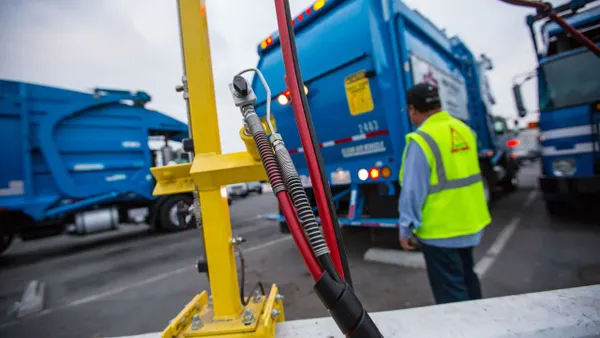Dive Brief:
- The Washington, D.C. City Council unanimously approved the Residential Composting Incentives Amendment Act of 2017 on May 1. This bill establishes a rebate of up to $75 for District residents who purchase and install a home composting or vermicomposting system. The bill aims to promote residential composting while helping to divert food waste from D.C.'s waste stream.
- The composting program will be implemented through the city's Department of Public Works (DPW). Over the coming months, DPW staff will pilot various compost bin models to identify those best suited to D.C.’s urban environment, with an eye toward rat resistance.
- "We’re excited about this bill, as it’s one more tool to help the District cut waste," Brenda Platt, Co-Director & Director of the Institute for Local Self-Reliance (ILSR) Composting for Community Initiative told Waste Dive. ILSR worked closely with the D.C. Council and with DPW to ensure a training component was included in the law so D.C. residents would receive the guidance and exposure to best practices necessary to succeed. According to Platt, "Backyard composting is undervalued and far more important than previously thought."
Dive Insight:
Per its Sustainable D.C plan developed in 2011 (and currently being updated), D.C. has a 2032 waste diversion goal of 80%. However, a January 2017 Solid Waste Diversion Report found a residential diversion rate of only 20.93% and a citywide residential diversion rate of 20.96%. A 2011 Solid Waste Characterization Study for the District of Columbia found food waste to make up approximately 15% of the District’s overall residential waste stream.
With an ever-growing urban population, rebates for vermicomposting systems — smaller than typical composting systems and can be managed indoors — were included in the D.C. bill. While the details of the rebate program have yet to be determined, participation in a brief compost training will be mandatory to ensure compliance with the District’s rat abatement program. An Austin, Texas residential composting rebate program could potentially provide guidance as well as lessons learned for the D.C program. Final approval of D.C.’s rebate program is contingent on funding.
A 2017 Compost Feasibility Study for the District recommended a five-year roll-out period for a curbside composting program, but as reported, the lack of a processing facility large enough to receive D.C.’s food waste represents a major stumbling block. DPW has had $8 million set aside in the 2023 budget to establish a food waste processing facility within the District boundaries with hopes of having a curbside composting program up and running shortly thereafter. The current version of the D.C. budget, which is pending approval, accelerates that funding — there is now $100K in FY19 for site planning and design, and then $4M in FY21 and $4M in FY22 for construction. A finite and already dense geographic area with a growing population coupled with rising property costs complicates the establishment of an in-District facility.
Meanwhile, the District is exploring creative ways to reduce food and other waste streams. In 2017, city-sponsored Food Waste Drop-Off sites were established in each ward near weekend farmers’ markets. The program surpassed expectations with almost 100,000 lbs. of food waste collected during the program’s first eight months. DPW has committed to expanding the program in addition to implementing the residential compost rebate program. Meanwhile, DPW is promoting “grasscycling,” urging residents and businesses to leave clippings on a yard (versus bagging them). Earlier this year, DOEE launched ReThread DC, a textile reuse and recovery initiative, while DPW is drawing up plans for a pay-as-you-throw residential waste pilot.









